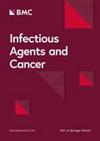自体干细胞移植期间感染 COVID-19 的多发性骨髓瘤患者
IF 2.8
2区 医学
Q3 IMMUNOLOGY
引用次数: 0
摘要
尽管全球都在开展疫苗接种活动,但某些患者群体仍然极易感染SARS-CoV-2,并极有可能出现不利的COVID-19结果。正如我们小组之前的研究以及 Chang Su 和同事最近的报告所示,接受自体干细胞移植(ASCT)的多发性骨髓瘤(MM)患者就是此类高危人群之一。这是由于潜在的与疾病相关的免疫缺陷、对疫苗的反应不佳、大量使用地塞米松以及在进行 ASCT 之前使用大剂量美法仑所致。在 ASCT 过程中感染 SARS-CoV-2 和出现 COVID-19 仍是这些患者的高风险事件。因此,在这种临床环境下,必须坚持并实施所有适当的策略来预防 COVID-19 的爆发。这可能包括根据不同 SARS-CoV-2 变体/亚变体的流通和流行情况,使用单克隆抗体进行有针对性的接触前和接触后预防,以及在尽管进行了预防的情况下,如果 MM 患者在移植过程中出现 COVID-19,应立即使用抗病毒药物。我们强调在 ASCT 过程的各个阶段定期监测 MM 患者是否感染 SARS-CoV-2 的重要性。这对于在目前的疫情后阶段及时采取措施降低 COVID-19 不良后果的风险至关重要。本文章由计算机程序翻译,如有差异,请以英文原文为准。
Patients with multiple myeloma infected with COVID-19 during autologous stem cell transplantation
Despite the global vaccination campaigns, certain patient groups remain highly vulnerable to SARS-CoV-2 and are at high risk for unfavorable COVID-19 outcomes. As previously shown by our group and a more recent report by Chang Su and coworkers, patients with multiple myeloma (MM) undergoing autologous stem cell transplantation (ASCT) represent one of such high-risk populations. This is due to the underlying disease-related immunodeficiency, suboptimal response to vaccines, heavy exposure to dexamethasone, and the use of high-dose melphalan prior to the ASCT procedure. Contracting SARS-CoV-2 and developing COVID-19 during the ASCT procedure remain high-risk events for these patients. It is then crucial to maintain and implement all appropriate strategies to prevent COVID-19 breakthroughs in this clinical setting. This might include targeted pre- and post-exposure prophylaxis with monoclonal antibodies, based on the circulation and prevalence of different SARS-CoV-2 variants/subvariants, and the prompt use of antivirals if, despite prophylaxis, MM patients develop COVID-19 during the transplantation procedure. We emphasize the importance of regularly monitoring MM patients for SARS-CoV-2 infection at all stages of the ASCT procedure. This is crucial to promptly implement measures to reduce the risk of unfavorable COVID-19 outcomes during the current post-pandemic phase.
求助全文
通过发布文献求助,成功后即可免费获取论文全文。
去求助
来源期刊

Infectious Agents and Cancer
ONCOLOGY-IMMUNOLOGY
CiteScore
5.80
自引率
2.70%
发文量
54
期刊介绍:
Infectious Agents and Cancer is an open access, peer-reviewed online journal that encompasses all aspects of basic, clinical, epidemiological and translational research providing an insight into the association between chronic infections and cancer.
The journal welcomes submissions in the pathogen-related cancer areas and other related topics, in particular:
• HPV and anogenital cancers, as well as head and neck cancers;
• EBV and Burkitt lymphoma;
• HCV/HBV and hepatocellular carcinoma as well as lymphoproliferative diseases;
• HHV8 and Kaposi sarcoma;
• HTLV and leukemia;
• Cancers in Low- and Middle-income countries.
The link between infection and cancer has become well established over the past 50 years, and infection-associated cancer contribute up to 16% of cancers in developed countries and 33% in less developed countries.
Preventive vaccines have been developed for only two cancer-causing viruses, highlighting both the opportunity to prevent infection-associated cancers by vaccination and the gaps that remain before vaccines can be developed for other cancer-causing agents. These gaps are due to incomplete understanding of the basic biology, natural history, epidemiology of many of the pathogens that cause cancer, the mechanisms they exploit to cause cancer, and how to interrupt progression to cancer in human populations. Early diagnosis or identification of lesions at high risk of progression represent the current most critical research area of the field supported by recent advances in genomics and proteomics technologies.
 求助内容:
求助内容: 应助结果提醒方式:
应助结果提醒方式:


